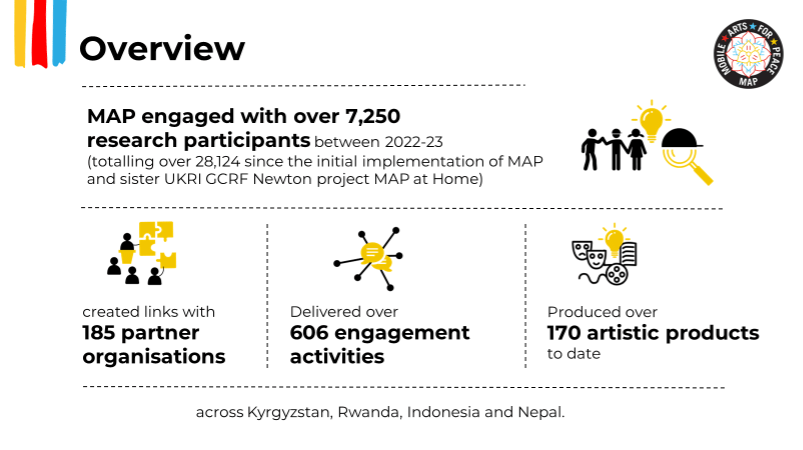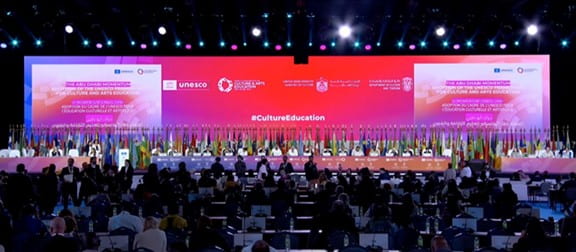Background on MAP
Mobile Arts for Peace (MAP) is a 4-year international, interdisciplinary applied research project, which began in 2020. MAP demonstrates the value of arts-based methods for everyday peacebuilding with and for young people in post-conflict affected countries (namely, Kyrgyzstan, Rwanda, Indonesia and Nepal). The research project is providing evidence of the gap in how young people can engage decision-makers to affect local and national policy/curricula changes through innovations with living cultural art forms.
Online side event
On 9 February MAP hosted an online side event, entitled ‘Artful research: informing national curriculums and youth peacebuilding policy in Nepal, Rwanda, Kyrgyzstan, and Indonesia’. It was attended by over 30 participants from a range of backgrounds including civil society, artists, officials, young researchers, and academics. The presentations, speakers and discussion focused on how artful spaces of dialogue can contribute towards educational/youth policy reforms. The speakers included Mr. Binod Prasad Pant from Kathmandu University, who discussed the pilot development of a Nepal Arts Education Framework with MAP, Ms. Juhi Adhikari, a young researcher, and Dr Sarah Huxley from the University of Lincoln/MAP, who shared ongoing work developing a local arts education curriculum through Janaki Women Awareness Society (Nepal). Participant discussions centred on enabling youth co-creation and adaptations of living cultural forms to find creative ways of seeking policy/curricula changes.
Key outcomes/actions from the side event
- Furthering planning discussions with the Ministry of Culture delegation from the government of Nepal at the Abu Dhabi conference
- Receiving invitations to learn more about potential synergies/areas for collaboration with civil society organisations
- Generating new contacts/networks within the academic arts education sector, including with InSea.
Contributions at the World Conference
On 13-15 February, MAP participated in the first UNESCO World Conference on Culture and Arts Education in Abu Dhabi. Over 90 ministers, 125 representatives of UNESCO Member States, policy-makers, NGOs, UN agencies, and academia gathered, including colleagues from InSea. The main outcome of the World Conference is a new global Framework for Culture and Arts Education.
Dr Sarah Huxley from MAP delivered an interjection at the Thematic Session 2: Lifelong and Life-wide Learning (which can be viewed here: https://www.youtube.com/watch?v=DHIvMmcYqLk 2:55:55], as well as a written interjection for Thematic Session 7: Monitoring, Research and Data. These are both recorded in the proceedings of the conference and position MAP as not only having an evidence bank of data in relation towards these two themes, but as willing to support the delivery of the Framework on Culture and Arts Education moving forward.
Key findings presented
1) There is a role/space for indigenous arts-based methods in/through research to affect/effect social change processes
2) Young people play a significant role in the re-imagining and adapting of cultural forms and intangible cultural heritage
3) MAPs pilot work with Kathmandu University to develop a Framework on Arts Education, focuses on integrating MAPs arts-based exercises into existing secondary school lessons (across different disciplines including social studies, biology and language lessons)
4) MAP has generated an evidence bank of arts-based monitoring, evaluation and learning approaches. These include participatory mixed methods/tools that draw from a range of ways of knowing, such as through ‘river journeys’, ‘well-being thermometers’ and so forth. As well as approaches that seek data and monitoring, through and with, indigenous living art forms themselves, for example the work in Rwanda using re-imagined proverbs.
This applied research shows that young people can partner and lead in shaping and delivering arts-based monitoring processes, and MAP hopes that the implementation of the Framework will include and build upon such approaches.
Further information
If you have further questions, please get in touch with map@lincoln.ac.uk
You can read more about the project on our website: https://map.lincoln.ac.uk/
Sign up to our newsletter here and receive a recording of the online side event.
Follow us on Twitter @Mobile__Arts
Mobile Arts for Peace is an AHRC/ GCRF Network Plus project (funded until June 2024). MAP is a collaborative project between civil society organisations and CSO workers, cultural organisations and artists, health institutions and psychosocial workers, universities and researchers, and children and young people.

